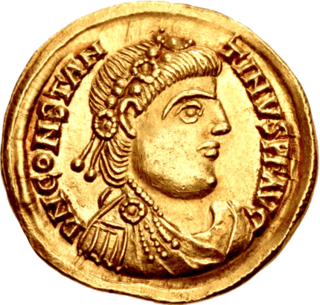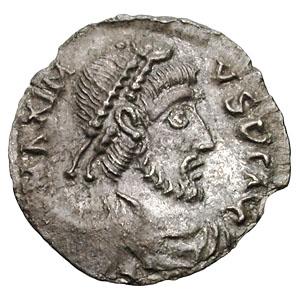Plot synopsis
The story is set in Britain in 405–411 CE, telling of the decline of the Roman government in the diocese of Britannia.
Caius Sempronius Felix is a career Imperial civil servant. Born in the port city of Tingis in the Roman province of Mauritania Tingitana, he has served in many major Roman centres and has, by dint of loyalty and hard work (and not a little absconding with treasury funds), been appointed praeses (provincial governor) of Britannia Prima. Based in Londinium, and nominally responsible to the vicarius of the diocese, he is effectively the ruler – treasurer, administrator and magistrate with wide powers. He is married for political reasons to Maria, a younger woman and nominal Christian. His father-in-law Gratianus is a rich and scheming financier.
Felix tries hard to maintain what he sees as the high standards of Roman administration and etiquette that he has learned in centres in continental Europe closer to Rome. He is ruthless in punishing suspected criminals and seeing that taxes are paid on time; he does not hesitate to engage in various casual cruelties with his slaves, and his judicial decisions are often arbitrary. But all about him, the civilisation he single-mindedly supports is slowly breaking down. He tries hard to balance his limited budget, despite a moribund economy and constant demands for extra military spending. Rome still wins some military victories, but then the Germans invade Gaul and Britain is cut off.
With ever more depressing news of other provinces breaking away from the Empire, military defeats and the threat of Saxon pirate activity on the coast, Felix finds himself drawn into a military coup. Gratianus conspires to declare Britannia independent of the remaining Roman Empire and elevates one Marcus, an army officer from Eburacum, to become Emperor of Britannia.
Despite his military skills, the Sacred Marcus, as he has now become, proves to be only semi-literate and a crude character. He quickly invites Maria to become his mistress, planning to remove Felix. Gratianus and Maria have Marcus assassinated. Felix thinks Britannia will now revert to supporting the legitimate emperor Honorius; but instead Gratianus has himself proclaimed Emperor. Felix is left completely dependent on them and aware that if Gratianus is overthrown he (as the emperor's son-in-law) will be put to death by any successor regime.
Gratianus and Maria become suspicious that the military commander, Constantine (the historical usurper Constantine III), may wish to make himself emperor and found a dynasty with his son Constans. They decide to pre-empt this by assassinating Constans; Maria will invite him to dinner, kill him, and accuse him of trying to rape her. Felix is aware of the plot and travels to Verulamium to give himself an alibi. Here, he is confronted by Paulinus, his confidential clerk, a freedman and one of the few educated men in Londinium he can talk to as an intellectual equal. The clerk reveals himself as the chief of the agentes in rebus (Imperial secret service) sworn to be loyal to the reigning emperor. He reveals that Constantine and Constans suspected Gratianus and Maria and pre-empted the plot by having them killed; Constantine will now declare himself emperor. He is required to arrest and interrogate Felix, but during the interregnum, he is technically masterless and he sympathetically gives Felix the opportunity to flee.
Felix travels westwards through a country he has never seen and knows little about; only now does he realise how far the province has deteriorated. He has no survival skills and cannot communicate with the scattered peasants who speak only Celtic. But after many months, he meets a Celtic soldier who takes him to the court of his brother, the client-king of the province of Britannia Secunda. The king gives Felix sanctuary in return for writing a history of his family and himself for posterity. Felix eventually dies of grief and despair after hearing of the sack of Rome by Alaric. Meanwhile, Constantine and Constans have taken the remaining Roman troops from Britain to mount an unsuccessful attempt to seize control of the whole Western Empire. They are killed and their troops annihilated, and the Romano-British population are left to fend for themselves under client-kings such as the one served by Felix.

Flavius Julius Constans, also called Constans I, was Roman emperor from 337 to 350. He held the imperial rank of caesar from 333, and was the youngest son of Constantine the Great.

Honorius was Roman emperor from 393 to 423. He was the younger son of emperor Theodosius I and his first wife Aelia Flaccilla. After the death of Theodosius in 395, Honorius, under the regency of Stilicho, ruled the western half of the empire while his brother Arcadius ruled the eastern half. His reign over the Western Roman Empire was notably precarious and chaotic. In 410, Rome was sacked for the first time since the Battle of the Allia almost 800 years prior.

Roman Britain was the territory that became the Roman province of Britannia after the Roman conquest of Britain, consisting of a large part of the island of Great Britain. The occupation lasted from AD 43 to AD 410.
The 410s decade ran from January 1, 410, to December 31, 419.

Year 411 (CDXI) was a common year starting on Sunday of the Julian calendar. At the time, it was known in Rome as the Year of the Consulship of Theodosius without colleague. The denomination 411 for this year has been used since the early medieval period, when the Anno Domini calendar era became the prevalent method in Europe for naming years.
The 280's decade ran from January 1, 280, to December 31, 289.

Flavius Valerius Constantius, also called Constantius I, was a Roman emperor from 305 to 306. He was one of the four original members of the Tetrarchy established by Diocletian, first serving as caesar from 293 to 305 and then ruling as augustus until his death. Constantius was also father of Constantine the Great, the first Christian emperor of Rome. The nickname "Chlorus" was first popularized by Byzantine-era historians and not used during the emperor's lifetime.

Valentinian I, sometimes called Valentinian the Great, was Roman emperor from 364 to 375. He ruled the Western half of the empire, while his brother Valens ruled the East. During his reign, he fought successfully against the Alamanni, Quadi, and Sarmatians, strengthening the border fortifications and conducting campaigns across the Rhine and Danube. His general Theodosius defeated a revolt in Africa and the Great Conspiracy, a coordinated assault on Roman Britain by Picts, Scoti, and Saxons. Valentinian founded the Valentinianic dynasty, with his sons Gratian and Valentinian II succeeding him in the western half of the empire.

Constantine III was a common Roman soldier who was declared emperor in Roman Britain in 407 and established himself in Gaul. He was recognised as co-emperor of the Roman Empire from 409 until 411.
Count Theodosius, Flavius Theodosius or Theodosius the Elder, was a senior military officer serving Valentinian I and the Western Roman Empire during Late Antiquity. Under his command the Roman army defeated numerous threats, incursions, and usurpations. Theodosius was patriarch of the imperial Theodosian dynasty and father of the emperor Theodosius the Great.

Constans II, also called "the Bearded", was the Byzantine emperor from 641 to 668. Constans was the last attested emperor to serve as consul, in 642, although the office continued to exist until the reign of Leo VI the Wise. His religious policy saw him steering a middle line in disputes between the Orthodoxy and Monothelitism by refusing to persecute either and prohibited discussion of the natures of Jesus Christ under the Type of Constans in 648. His reign coincided with Muslim invasions under, Umar, Uthman, and Mu'awiya I in the late 640s to 660s. Constans was the first emperor to visit Rome since the fall of the Western Roman Empire in 476, and the last one to visit Rome while the Empire still held it.

In modern historiography, the Western Roman Empire was the western provinces of the Roman Empire, collectively, during any period in which they were administered separately from the eastern provinces by a separate, independent imperial court. Particularly during the period from AD 395 to 476, there were separate, coequal courts dividing the governance of the empire into the Western provinces and the Eastern provinces with a distinct imperial succession in the separate courts. The terms Western Roman Empire and Eastern Roman Empire were coined in modern times to describe political entities that were de facto independent; contemporary Romans did not consider the Empire to have been split into two empires but viewed it as a single polity governed by two imperial courts for administrative expediency. The Western Empire collapsed in 476, and the Western imperial court in Ravenna disappeared by AD 554, at the end of Justinian's Gothic War.

The end of Roman rule in Britain occurred as the military forces of Roman Britain withdrew to defend or seize the Western Roman Empire's continental core, leaving behind an autonomous post-Roman Britain. In 383, the usurper Magnus Maximus withdrew troops from northern and western Britain, probably leaving local warlords in charge. In 407, the usurper Constantine III took the remaining mobile Roman soldiers to Gaul in response to the crossing of the Rhine, and external attacks surged. The Romano-British deposed Roman officials around 410 and government largely reverted to the city level. That year Emperor Honorius refused an appeal from Britain for military assistance. The following decades saw the collapse of urban life and the beginning of Anglo-Saxon settlement.

Constans II was the son of Western Roman emperor Constantine III, and served as his co-emperor from 409 to 411. Constans was a monk prior to his father being acclaimed emperor by the army in Britain in early 407, an act of rebellion against the ruling emperor Honorius. He was summoned to Gaul, appointed to the position of caesar (heir) and swiftly married so that a dynasty could be founded. In Hispania, Honorius's relatives rose in 408 and expelled Constantine's administration. An army under the generals Constans and Gerontius was sent to deal with this and Constantine's authority was re-established. Honorius acknowledged Constantine as co-emperor in early 409 and Constantine immediately raised Constans to the position of augustus (emperor), theoretically equal in rank to Honorius as well as to Constantine. Later in 409 Gerontius rebelled, proclaimed his client Maximus emperor and incited barbarian groups in Gaul to rise up. Constans was sent to quash the revolt, but was defeated and withdrew to Arles. In 410, Constans was sent to Hispania again. Gerontius had strengthened his army with barbarians and defeated Constans; the latter withdrew north and was defeated again and killed at Vienne early in 411. Gerontius then besieged Constantine in Arles and killed him.

Britannia Superior was a province of Roman Britain created after the civil war between Septimius Severus and Clodius Albinus. Although Herodian credits Severus with dividing Roman Britain into the Northern territory of Britannia Inferior and the Southern territory of Britannia Superior, modern scholarship argues that it is more likely that Caracalla was the person who made the split sometime in the early 3rd century CE. The previous British capital Londinium remained the centre of Britannia Superior while Eboracum, or modern York was the capital of Britannia Inferior. Epigraphical evidence shows that Upper Britain encompassed approximately what is now Wales, southern England and East Anglia. However, the official boundary between Britannia Superior and Inferior is still unclear.
Gratian or Gratianus was a Roman usurper in Roman Britain from 406-407.
Gratianus "Funarius" was an Illyrian soldier of the Roman Empire who flourished in the 4th century. He was the father of Roman emperors, Valentinian I and Valens, founders of the Valentinianic dynasty.

Maximus was a Roman usurper (409–411) in Hispania. He was declared emperor by the general Gerontius, who might have been his father.












